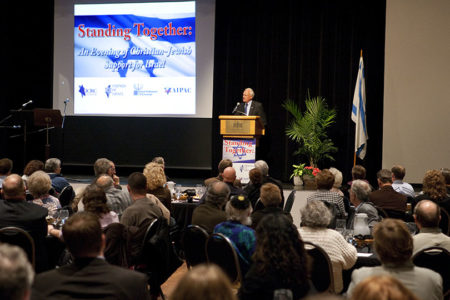Is There a Way Back?
Rev. Franklin Graham ended his prayer at the 2001 inaugural ceremony of U.S. President George W. Bush with these words:
Now, O Lord, we dedicate this presidential inaugural ceremony to you. May this be the beginning of a new dawn for America as we humble ourselves before you and acknowledge you alone as our Lord, our Savior and our Redeemer. We pray this in the name of the Father, and of the Son, the Lord Jesus Christ, and of the Holy Spirit. Amen.
His reference to the Trinity and to the Lord Jesus Christ in particular raised a firestorm of controversy, instigating both a lawsuit and calls to declare Rev. Graham persona non grata at public events. The clamor exemplifies the intensity of opposition to Christianity, as atheists and others mire society in a neo-paganism designed to refit the American dream into an anarchist, God-hating nightmare.
Jesus Christ Is Not a Silent Partner
The story of the Gospels is the incarnation, ministry, death, resurrection, ascension, and coming again of Jesus Christ. When God stepped into time in the person of His Son, He did not appear as a sidebar to history. While pagan devolution convulsed around Him, Jesus moved as the singular solution to the human dilemma. He cannot be minimized, marginalized, or ignored. He is the deciding factor in whether we live or die, prosper or perish. In biblical terms we are told that God the Father
raised Him [Christ] from the dead and seated Him at His right hand in the heavenly places, far above all principality and power and might and dominion, and every name that is named, not only in this age but also in that which is to come (Eph. 1:20–21).
One of the greatest scenes played out on the stage of history was the clash of dominions in Jerusalem as Jesus stood condemned before Rome’s emissary, Pontius Pilate. After sparring verbally with Jesus’ accusers, Pilate confronted the Christ:
“Are You the King of the Jews?” Jesus answered, “My kingdom is not of this world.”…Pilate therefore said to Him, “Are You a king then?” Jesus answered, “You say rightly that I am a king. For this cause I was born, and for this cause I have come into the world, that I should bear witness to the truth. Everyone who is of the truth hears My voice.” Pilate said to Him, “What is truth?” (Jn. 18:33, 36–38).
It matters little whether the perplexed prefect posed the question out of ridicule, sarcasm, or sincerity. His question still hangs heavy in the air today. What, indeed, is truth?
Unbeknown to him, Pilate stood before the Source of truth and had heard the essentials concerning the God-Man’s entry into this world, His birth, His mission, and His Kingdom.
Jesus’ Birth
The current all-out war against the mention of Jesus’ name, the details of His birth, and all public displays of the nativity is beyond comprehension. If someone does not believe in the incarnation, why harass public officials, wear out the courts, and infuriate Christians (and Americans in general) with furious attacks? After all, if nothing else, Christ’s birth is a wonderful story.
But His birth isn’t the issue. The issue is Jesus Christ Himself. A crusade is afoot to search and destroy every aspect of His personage because of who He is and all He and His followers represent. The words of the late H. G. Wells may illustrate the enigma Jesus has become to intellectual elitists pursuing His destruction:
I am an historian, I am not a believer, but I must confess as a historian that this penniless preacher from Nazareth is irrevocably the very center of history. Jesus Christ is easily the most dominant figure in all history.
Confirmations of the imminent nativity were etched in the Old Testament with such intimate detail that there could be no mistake that God was indeed invading humanity through the coming of His Son. The Hebrew Scriptures even identified, thousands of years before the fact, the precise location of His arrival:
But you, Bethlehem Ephrathah, though you are little among the thousands of Judah, yet out of you shall come forth to Me the One to be Ruler in Israel, whose goings forth are from of old, from everlasting (Mic. 5:2).
It is with the utmost confidence, therefore, that believers the world over congregate in great hosts and unity of spirit to remember and revere His birth. Christians should never surrender to the forces of denial by muting their joy over Him who came to Earth, provided their spiritual fulfillment, and changed their lives and the course of human history. His arrival in Bethlehem laid the first great stepping stone to eternity, affirming that God had not left the scene and that a plan was in motion to make all things right.
His Mission
He laid His mission before Pilate: “I have come into the world, that I should bear witness to the truth” (Jn. 18:37). Everything in God’s economy is based on truth—truth that is personified in Christ.
As I write this article, nations stagger directionless through a morass of uncertainty and confusion. The big questions are, “Where are we going?” and “What will the future hold for our children, grandchildren, and the generations that will follow?”
A cataclysmic loss of understanding concerning why we exist inevitably results in a loss of purpose and direction. The biblical word lost precisely describes this world’s dilemma. Humankind was not created to go it alone; and when people attempt it, catastrophe results. Some individuals succumb to a functional nihilism—the belief that traditional beliefs are useless and that there is no objective ground of truth, particularly moral truth.
Some believe things have so bottomed out that the destruction of the entire social and political system is a desirable end to pursue. Is it any wonder that forces are at work from both within and without to destroy America and all of its historic biblical moorings, moral precepts, and social order?
In this frame of reference, the Bible and Christ must be cast out because Christ personifies truth and the Bible resonates with essential moral order. In a sense, when Jesus said, “I am the way, the truth, and the life” (Jn. 14:6), He threw down the gauntlet. The annual down-with-Christ-and-Christmas crusaders, so successful in banishing everything Christian from the public square, have more in mind than ripping up manger scenes and scattering sheep from living Christmas displays.
Is There a Way Back?
Today it is not unusual to be asked if we’ve gone so far down the wrong road that there is no way to return to what once made America great. Have we seen the passing of what has been called the Greatest Generation?
When I was a grammar-school child growing up in a small town in Michigan, I don’t recall a great deal of religious emphasis in the classroom. Every morning we said the Pledge of Allegiance and respectfully honored the American flag. It was a time in our history that now seems worlds away.
America was in the waning grips of the Great Depression that knocked the props out of more than the stock market. Veterans of World War I who had endured the terrors of the trenches were still among us, telling their stories of the “war to end all wars.”
Prohibition had ended a few years earlier and left behind thugs and gangsters seeking new avenues of illicit employment. The flappers’ legacy was a “new breed” of American women who were not exactly models of moral propriety. It was a time when some may have questioned where we were going.
Then one morning, we were told there would be a special program in the gymnasium after lunch. The guests were the America Back to God quartet. The repertoire blended patriotic and spiritual music, a good measure of it calling for the nation to turn back to the God of our fathers and emphasizing that the nation is blessed “whose God is the Lᴏʀᴅ” (Ps. 33:12). Though the quartet’s music may not fly with the modern set today, secular or Christian, the message was right on the mark.
Whenever Israel strayed from the pathway of God’s purpose, the solution was to repent and return. Repentance involves turning around and moving in another direction. Someone once said repentance is a change of mind that produces a change of direction.
America needs a new direction. Without it, our downward trajectory will continue until one day we will find ourselves on the scrap heap of history, along with other great empires and nations that followed the wrong path.
The call of this hour is to return to the Book that sets the parameters for all things right and true. We need to hear the voice of the prophet in the land—a voice that replaces the self-betterment homilies currently passing as sermons with “For there is born to you this day in the city of David a Savior, who is Christ the Lord” (Lk. 2:11). The ramifications of that message are the needs of the hour, trumpeting that Christmas is alive and well, for He has arrived!
The Last Word
Pilate heard another word: “You say rightly that I am a king” (Jn. 18:37).
What does the future hold? On this matter there need be no confusion. The world will not end in a fog of carbon gases or with too many mouths to feed and not enough bread. No, the King is coming; and the future is assured (though we hear far too little of it from pulpits today). At this very moment there is a desperate need for a Redeemer who will buy back from the slave market of sin the individuals who turn to Him by faith.
And to a world gone mad, One will come who can judge the nations, establish equity and justice, and rule with unerring truth and righteousness. We are acutely aware that such a ruler is not presently available. His credentials are defined in the prophetic Scriptures. His peace is the song of our hearts. His hope is the Blessed Hope of His return for which we long.
Perhaps God is asking you today to decide between truth and error, the broad path and the narrow way. As the great Jewish leader who succeeded Moses declared, “Choose for yourselves this day whom you will serve….But as for me and my house, we will serve the Lᴏʀᴅ” (Josh. 24:15). That choice is yours.







